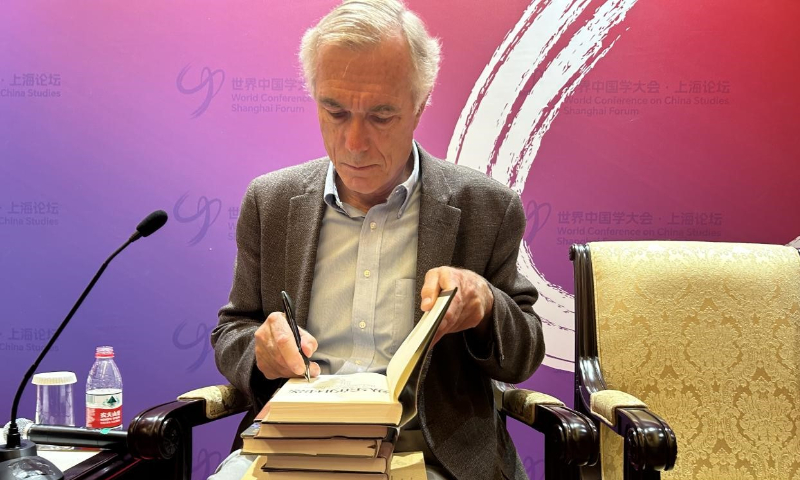Editor's Note:The World Conference on China Studies - Shanghai Forum on Friday announced the winners of the 2023 Award for Distinguished Contributions to China Studies. They included Timothy Brook, professor emeritus at the Department of History, University of British Columbia, Baik Young-seo, professor emeritus at Yonsei University, and Kishore Mahbubani, distinguished fellow of the Asia Research Institute, National University of Singapore.The Award for Distinguished Contributions to China Studies recognizes those who have made outstanding contributions to the development and global exchanges of China studies, as well as the promotion of Chinese civilization. Since 2010, 22 scholars have won the award.Brook and Baik participated in the Friday forum offline in Shanghai and delivered acceptance speeches. Prior to that, the two scholars on Thursday shared with the media their observations and thoughts on China studies, Chinese civilization, as well as China's role in promoting mutual learning among civilizations.This installment is about Brook, a Canadian historian whose writings situate China in the world and bring the perspective of the world to people's understanding of China.

Timothy Brook signs a Chinese edition of his book on November 23, 2023. Photo: Huang Lanlan/GT
Timothy Brook visited China for the first time in the 1970s, and has returned to the country many times since then to conduct deep exchanges with Chinese scholars.
A specialist in Chinese history, Brook is particularly fascinated by the Ming Dynasty (1368-1644), and has published several books and academic papers on the dynasty over the decades. His latest book, The Price of Collapse: The Little Ice Age and the Fall of Ming China, was published by Princeton University Press this month.
"One of the reasons why I'm so interested in the Ming Dynasty, is that it was a beginning of the dialogue between China and Europe that continues to this day," Brook said, speaking in fluent Chinese, on Thursday. "Europeans began to come to China in the 16th century," he noted.
Unlike a lot of other China scholars, Brook's observations usually situate China in a broad global context, and present the connection between China and the West. "China and the world should understand each other better," said Brook, noting that both Westerners and Chinese people should understand their history differently.
He therefore suggested today's young international scholars should look at China in a global context, especially in the era of globalization, when mutual learning among civilizations matters even more.
"You have to not only immerse yourself in Chinese culture and language, but also immerse yourself in the world - use the knowledge of where you come from, and bring that to bear on the knowledge that you gain about China," Brook told the Global Times. However, doing this is "not easy," he added.
Hailed as one of the best storytellers among North American historians, Brook has found a broad readership both in China and overseas for his many books, such as The Confusions of Pleasure: Commerce and Culture in Ming China, and Vermeer's Hat: The Seventeenth Century and the Dawn of the Global World.
The books open a window for international readers to learn more about Chinese history and civilization.
"I keep writing books about China in order to increase the outside world's understanding of China," said Brook. It's important to let foreigners know that Chinese history is not something far away, strange or difficult to understand, he noted.
For Chinese readers, Brooks' observations and insights offer a precious "outsider" perspective.
"Even though I will never fully understand China as an 'insider' does, this 'outsider' has crafted ideas and insights that may help us to achieve a more objective and more universal knowledge of China, and not just of China on its own terms and for itself, but of China as part of the world, which is, after all, where we all live," Brook said in an acceptance speech at the forum on Friday.




